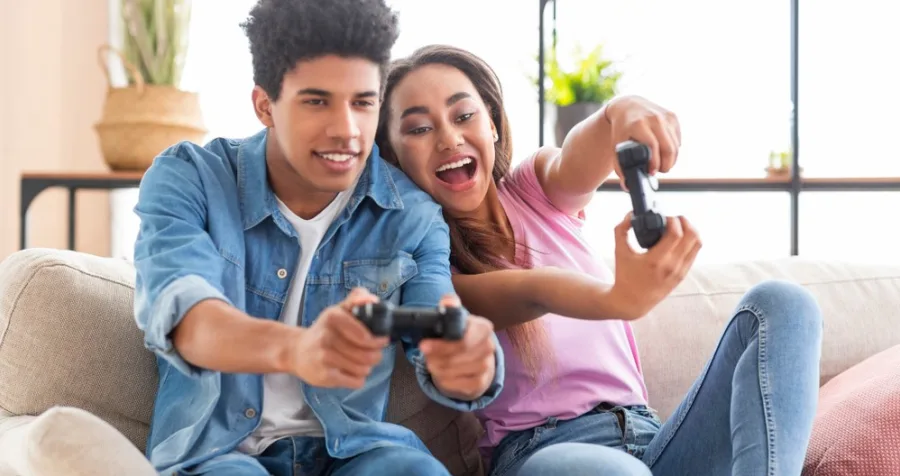Gaming and gambling: What’s the difference?

The YMCA Youth Gambling Awareness Program (YGAP) defines gambling as “risking something of value when you don’t know if you will win or lose.”
“It’s a myth that you can only gamble with money,” says Dua Fatima, Youth Outreach Worker for YMCA in Toronto West. “Let’s say you’re playing a video game with skins, which are essentially decorative items for your character, and your friend says, ‘If I win the next game I get your rare skin.’ If you agree, you’re risking something of value even if it’s not money.”
Blurring the lines between gaming and gambling
One example of how lines are blurred between gaming and gambling is with freemium games—any game that lets you download and play for free but has options to pay within the game for extra features like ‘a chance to progress quicker’. These features are common and popular in games such as Candy Crush Saga, Subway Surfers, and Roblox (a game platform).
Where the lines blur even further is when skill-based games include gambling elements. Plants vs. Zombies, for example, is a popular skill-based game, easily downloadable on a smartphone, that includes a slot machine where players can bet in-game currency for a chance to win things like extra currency or extra features like seeds to grow weaponized plants.
“Gaming is skill-based and gambling is chance-based, so if a game is offering both, it’s confusing for the brain,” says Fatima.
These days, almost every game offers some kind of randomized virtual card packs, mystery boxes or loot crates. “Regardless of what they’re called, the concept is the same: you use real-world or in-game money to purchase, but you don’t know what you’re going to get inside. Is that gambling? If you’re risking real or in-game money and you don’t know what you will get, then yes, it fits the definition of gambling.”
 But once again, the lines are often blurred. Buying skins—a graphic or audio download that changes the appearance of your in-game character—isn’t considered gambling if you know exactly what you’re purchasing. But it can turn into gambling if you’re spending money on mystery boxes in hopes of getting a rare (and valuable) skin. Rare skins have different monetary values online and can be sold on other sites for in-game currency. They can also be sold for real money.
But once again, the lines are often blurred. Buying skins—a graphic or audio download that changes the appearance of your in-game character—isn’t considered gambling if you know exactly what you’re purchasing. But it can turn into gambling if you’re spending money on mystery boxes in hopes of getting a rare (and valuable) skin. Rare skins have different monetary values online and can be sold on other sites for in-game currency. They can also be sold for real money.“If you’re selling skins on Skins Cash and Skinwallet, and you’re also using them to bet — a lot of skins go for a lot of money — then that’s gambling,” says Fatima.
Understanding the warning signs
Just because youth are betting or gambling in a video game doesn’t mean they’re experiencing a problem or it will turn into one. Gaming also has positive attributes, such as providing socialization opportunities. Most youth won’t develop a problem, but they are up to four times more at risk than adults.
For parents, it’s important to look for warning signs.
“Their behaviors may look very different from someone else who also has a problem—it’s not one size fits all,” says Sally Herod, Youth Outreach Worker with YMCA Niagara Employment & Immigrant Services.
One potential warning sign is constantly trying to make bets online or offline. Another potential warning sign is a noticeable change in their dedication to school, relationships and/or extracurricular activities.
If they’re risking items that are important to them, like a rare Pokémon card, or items that aren’t OK to lose, like their lunch money, that could indicate problematic behaviour. “How much money are they spending opening a loot crate to possibly get a chance to win that rare skin? What are the odds of actually getting it—and how is not winning impacting their mental health?” says Herod.
Where to find help
There are several free resources available to parents to help navigate these warning signs, such as On-Line Gamers Anonymous, which offers resources and tools for family and loved ones. Game Quitters also provides a number of resources just for parents.
YMCA has also developed workshops for parents on the topic of gambling and gaming and the warning signs to watch out for, as well as strategies to help, such as budgeting and setting screen time limits. YMCA can also connect parents with a number of free resources, support groups and treatments, either virtual or in-person. Visit YGAP’s website or contact YGAP’s Youth Outreach Worker in your region for more information and/or book a gambling/gaming awareness workshop.










